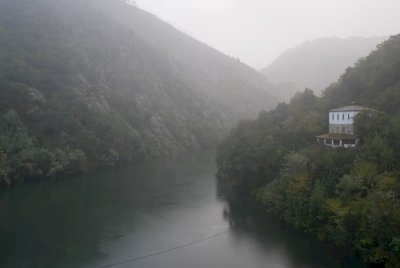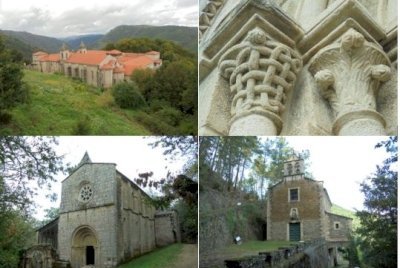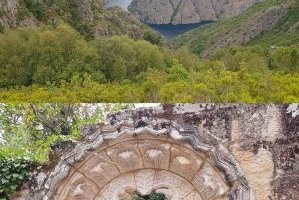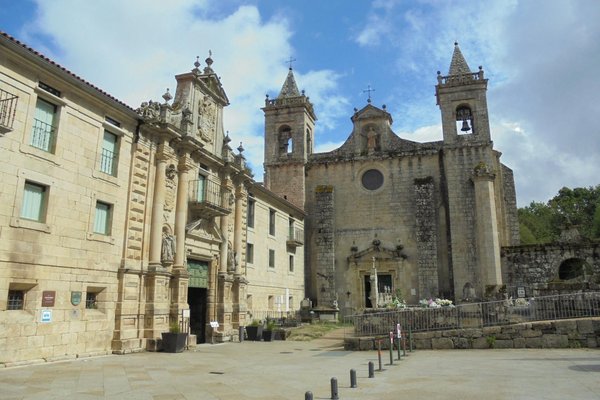Spain
Ribeira Sacra Waterscape
Ribeira Sacra is a wine-growing region on the banks of the Sil and Miño rivers in the provinces of Lugo and Ourense in northwestern Spain. It is believed that the region's name, Ribeira Sacra (Sacred Riverside), dates back to the Middle Ages. Between the 6th and 12th centuries, numerous monasteries and hermitages were founded, which are located in the almost inaccessible gorges and steep slopes of the area.
Site Info
Official Information
- Full Name
- Ribeira Sacra Waterscape (ID: 1228)
- Country
- Spain
- Status
-
Nominated 2026
Site history
History of Ribeira Sacra Waterscape
- 2021: Requested by State Party to not be examined
- Was recommended for Not Inscribe
- Type
- Cultural
- Criteria
- v
Links
- UNESCO
- whc.unesco.org
All Links
UNESCO.org
- whc.unesco.org — whc.unesco.org
Community Information
- Community Category
- Cultural Landscape: Continuing
Travel Information
Recent Connections
News
No news.
Recent Visitors
Visitors of Ribeira Sacra Waterscape
- Adolfo
- Ammon Watkins
- Angela Vandyck
- Argo
- Bram de Bruin
- Christravelblog
- Clyde
- David Berlanda
- Echwel
- emvcaest
- Evgenii
- George Gdanski
- GeorgeIng61
- Hubert
- Jakob F.
- Janina Lehmann
- Jan-Willem
- Jarek Pokrzywnicki
- Jasam
- Javier Coro
- Jay T
- Jonas Kremer
- Jurre
- Ludvan
- Mathijs
- MAURO PODDA PANI
- nan
- Patrik
- Paul Schofield
- Persian Globetrotter
- Roman Bruehwiler
- scubarrie
- Solivagant
- Stanislaw Warwas
- Szucs Tamas
- Thomas Buechler
- Tim Allen
- usagi1974
- Wojciech Fedoruk
Community Reviews
Show full reviews
Unlike most of the year, November in Spain in general and more specifically in Galicia is anything but dry. It rains frequently and heavily. Which is a pleasant surprise if you packed no serious hiking gear and plan to visit the Canon del Sil. Luckily, I had already noted a few days prior in Madrid that my luggage and the weather did not match and made a short visit to the local shopping mall.
Main focus of my trip were the many inscribed sites of Northern Spain. With the Ribeira Sacra scheduled in the next year, I made an effort to visit.
The train line from Monforte de Lemos to Ourense cuts right through the proposed core zone and follows the Sil for a few kilometers. I took a morning train to Santo Estevo. When I exited the train, it was already clear that I would get soaked.
From the train station, I walked a little to the bridge across the Sil. The views with the clouds covering the canyon were stunning. I then hiked up to the Monastery Santo Estevo de Ribas de Sil where I visited the church, before descending again.
OUV
Disclaimer: Nowadays, I wouldn't bet against Spain. Even if neither me nor ICOMOS can spot OUV. So take my judgement with a grain of salt.
With that out of the way, I have to say that the landscape was great and I would have enjoyed spending more time (with less …
Keep reading 0 comments
Site visited in September, 2020. I am very much in favour of inscription of this area. Landscape is pretty spectacular, while monastic monuments are well maintained and preserved even while they mostly do not serve its initial function.
Travelled from Las Medulas towards Ribeira Sacra I passed through amazing Mirador de Pontenovo (mouth of river Navea into Bibei, close to Central Hidraulica de Pontenovo). Although it is outside the designated area it is the perfect example of what you can expect in Ribeira Sacra – deep canyons, rocky mountains and rivers. From there I passed through mountainous area towards Parada de Sil.
I stayed overnight in Casa Pepe – upper level budget accommodation, there are also a few other hotels as well as restaurants in the village together with some shops and tourist information (main municipality building, maps and hints of the area available). It may be a good starting point to begin exploration of eastern part of Ribeira Sacra.
From Parada de Sil there is a direct asphalted road to Balcon de Madrid (not far from the village). One of the best picturesque places in the whole Ribeira Sacra. Local legend says that its name was taken from women that were watching for their husbands who were travelling to Madrid. Obviously it is just a legend as the main view from Balcon de Madrid is to the north (while Madrid lies to the south) and is located too far to be visible. While in the area …
Keep reading 0 comments
Ribeira Sacra is the official candidate site for Spain in 2021. The name could translate into “Sacred river bank” for the high number of churches and monasteries that were built over centuries along the Sil and Minho rivers. In this area of Galicia, these two rivers run in deep valleys, which sometimes look like canyons. First Christian hermits settled there in the 6th century, looking for remote and difficult to reach places, a tradition that originates from Middle East. Monasteries were then built at different periods, in different styles, and one of them is still active today. The nomination file focuses on this aspect of continuous occupation for religious purposes and claim it was the first area to develop in such way in Europe. The nominated area covers the canyons of Minho and Sil rivers until the point where they merge, plus three additional small areas with one monastery each, a few kilometres apart.
We first visited San Pedro de Rocas monastery. This is the oldest settlement of the nomination and the church was partly dug into the rock, as the name says it. It was first mentioned as early as 573 AD. The church was closed when we visited, but you can easily look inside through the grid that closes the entrance and appreciate how walls and rocks mix ; plus you can also freely walk around the buildings and spot medieval tombs carved into the rock, take a picture of the bell tower built on top of …
Keep reading 0 comments
